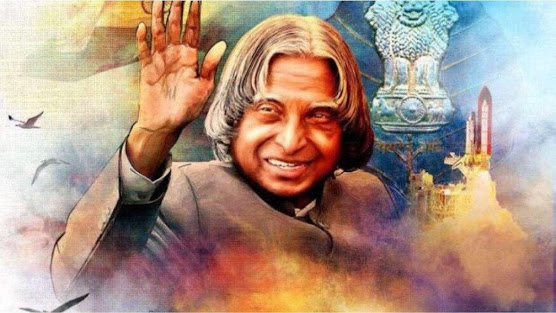Avul Pakir Jainulabdeen Abdul Kalam, more popularly known as Dr. A.P.J Abdul Kalam was born on October 15, 1931 on the island of Dhanushkodi off the southeastern coast of India. He developed an early fascination for flight by watching birds, which developed into an interest in aeronautics after he saw a newspaper article about a British fighter plane.
Despite his modest beginnings, Abdul Kalam was a bright student who showed promise in science and mathematics. Kalam's father was a devout Muslim, who owned boats which he rented out to local fishermen. He was also the Imam (prayer leader) of the mosque. He was a good friend of Hindu religious leaders and school teachers at Rameshwaram, Tamil Nadu.
His father often took his son along as he discussed various religious and state issues with the leaders of other religions. It was here that Kalam imbibed tolerance and secularism. As he grew up, in order to support his studies, he became a newspaper vendor and delivered newspapers every morning. As the family was economically poor, his mother used to save a small portion of the kerosene oil used in the household, so that it could be used later by his son in lighting the lamp as he sat studying late at nights. All the while, he proved that he was a bright student.
He attended St. Joseph's College, and went on to earn a degree in aeronautical engineering from the Madras Institute of Technology.
His hopes of becoming a fighter pilot were dashed when he narrowly missed out on a spot with the Indian Air Force. Kalam instead joined the Defense Research And Development Organization (DRDO) as a senior scientific assistant in 1958. After moving to the newly formed Indian Space And Research Organization (ISRO) in 1969, he was named project director of the SLV-III, the first satellite launch vehicle designed and produced on Indian soil.
Returning to the DRDO as director in 1982, Kalam implemented the Integrated Guided Missile Development Program. He then became the senior scientific adviser to India's defense minister in 1992, a position he used to campaign for the development of nuclear tests.
Abdul Kalam was a key figure in the May 1998 Pokhran-II tests, in which five nuclear devices were detonated in the Rajasthan desert. Have you heard of the movie: "Parmanu: The Story of Pokhran", a 2018 Indian film which describes what happened in Pokhran in 1998. Although the tests resulted in condemnation and economic sanctions from other world powers, Kalam was hailed as a national hero for his strong defense of the country's security.
In 2002, India's ruling National Democratic Alliance helped Kalam win an election against Lakshmi Sahgal and become India's eleventh president. Kalam also set a goal of conducting 5 lakh one on one meetings with young people over the course of his 5 year term. His immense popularity led to his being nominated by MTV for a Youth Icon of the Year award in 2003 and 2006.
After leaving office, Kalam became a visiting professor at the Indian Institute of Management at Shillong, Ahmedabad and Indore. He was also an honorary fellow of the Indian Institute of Science and Technology, Thiruvananthapuram, proffesor of Aerospace Engineering at Anna University along with numerous other institutions across the country. He also taught information technology at the International Institute of Information Technology at Banaras Hindu University and Anna University.
His "What Can I Give Movement" in 2011, was aimed at the youth of India and its central theme was defeating corruption. The same year, he faced a lot of criticism from civil groups over his stand on the establishment of the Koodankulam Nuclear Power Plant. He had supported the nuclear power plant and had said that it should be made. However, the local people of the area were not assured though Kalam had promised them of taking all safety measures.
On July 27, 2015, Kalam suffered a massive heart attack while lecturing at the Indian Institute of Management and subsequently died at the age of 83.
Kalam was laid to rest on July 30 with full state honors in his native state, Tamil Nadu. The Government of India established Kalam's birthday (October 15) as "Youth Renaissance Day". He was granted the Padma Bhushan in 1981, the Padma Vibhushan in 1990 and the Bharat Ratna in 1997, which are India's highest civilian awards. He even wrote several books such as the "Wings Of Fire" in 1999.
Abdul Kalam was closely associated with the Honey Bee Network and The National Innovation Foundation. Kalam has also written several inspirational books, most notably his autobiography "Wings Of Fire", aimed at motivating the Indian Youth. He has written poems in Tamil as well!
Amazing fact at the end: Among various others, Kalam directed two projects in the 1970's, namely, Project Devil and Project Valiant, which sought to develop ballistic missiles from the technology of the successful SLV programme.
Thank you for reading! I hope you got inspired from the life story of India's respected great scientist Dr. A.P.J Abdul Kalam!
--------------------------





Post a Comment